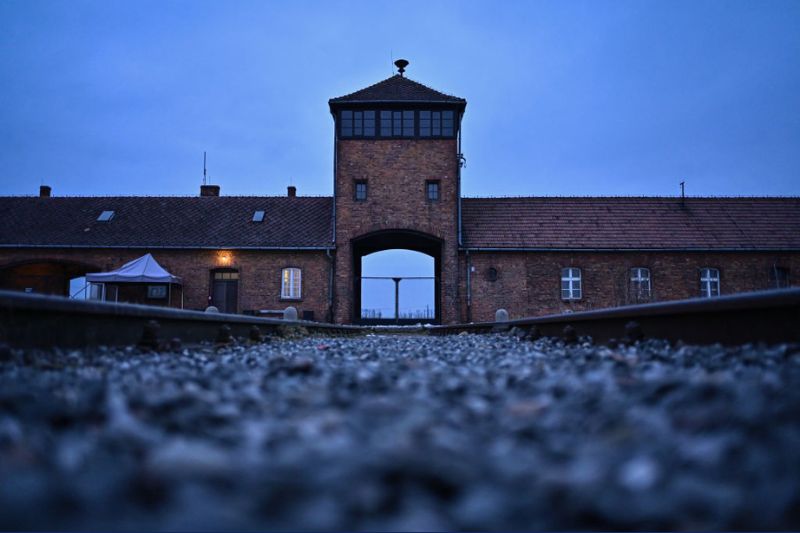Every so often, Schrodinger’s cat walks into the room, jumps into a box and stays there (I think). I mean this, of course, figuratively. We’re not the Schrodingers, and our cat is called Andy, and he makes himself known often enough that we should never doubt his existence.

Schrodinger’s cat this time has taken the form of findings from a recent survey by The Economist/YouGov on the Holocaust. They are both surprising and unsurprising, both unreal and all too real.
In the survey of young Americans, 20 per cent of respondents, aged from 18 to 29, thought that the Holocaust was a myth. This belief dropped to 8 per cent in those aged 30 to 44. Another third of respondents were not sure if it was or wasn’t a myth.
The Economist asked of the finding: ‘Now for the harder part: why do some young Americans embrace such views? Perhaps surprisingly, education levels do not appear to be the culprit. In our poll, the proportion of respondents who believe that the Holocaust is a myth is similar across all levels of education.’
Can someone be having a laugh? No. You can cry though.
History is both mirror and window. The teaching and therefore the knowledge of the past brings distance close. Indeed, on a personal level, whether consciously or not, everyone lives with their history, carries it around with them, are led by the hand or pushed by it.
And so with society.
If knowledge of history fades into the mist, then given that nature abhors a vacuum, the space will be filled with ignorance, and worse, wilful malice. And it is not pretty what then comes into play. It is ego writ globally. It can be, as George Orwell wrote, funnelled into The Party, where ‘who controls the past controls the future. Who controls the present controls the past.’
'If knowledge of history fades into the mist, then given that nature abhors a vacuum, the space will be filled with ignorance, and worse, wilful malice.'
And where ‘every record has been destroyed or falsified, every book rewritten, every picture has been repainted, every statue and street building has been renamed, every date has been altered. And the process is continuing day by day and minute by minute. History has stopped. Nothing exists except an endless present in which the Party is always right.’
The other side of the coin to this is upon which The Economist touches. What is the fate of an event in history – in this case the monstrous attempt to annihilate the Jews of Europe through the Holocaust, of which 6 million died and millions more were displaced and forever torn apart from family, friends and communities – when it is brushed aside as myth? Does the testimony, the Nuremberg trials, the millions of words of documentation, the ashes, the shoes, the trainlines running into the extermination camps mean nothing?
Were all the pogroms and genocides in history therefore also only myth? Of course not. The answer, one suspects, lies with the person. When they look through the window, they see only what they want to see. To many, revelation is not close at hand, nor is it desired. Witness Donald Trump’s awkwardness with the truth. His view of the lie of the land is often, and deliberately so, different to what others see.
The machinery of myth is also fed with other means than just prejudice, in particular the decline in the study of history worldwide, the rising tide of social media, and the upward trend in people getting their news from such platforms. It goes without saying, or should be, that not all platforms are closely aligned to the truth.
The same age group (18 to 29) who showed an alarming belief in myth also, according to a survey by the Pew Research Centre, found no difference between social media and news organisations in the veracity of news that was posted.
Feeding into that, as reported in The Conversation, is the decline in teaching and studying history. Writing for the academic website, Martin Crotty, Associate Professor in Australian History, Frank Bongiorno, Professor of History, ANU College of Arts and Social Sciences, and Paul Sendziuk, Associate Professor in History, reported ‘a crisis in the study of history in Australian universities’.
‘We found student enrolments (anyone studying a history course) had declined by roughly 23 per cent since 2016,’ they wrote. ‘Teaching and research staff numbers had also continued to slide, down another 8 per cent to 319 full-time equivalent positions. This takes the overall drop in staff numbers to 31 per cent since 1989.’
In the United States, The Smithsonian magazine reports: ‘According to statistics from the National Centre for Education Statistics, there were 34,642 history majors in 2008. Fast forward to 2017, the count was 24,266. Most of that decline occurred after 2012, with a notable single-year drop of more than 1500 between 2016 and 2017.’
Of bachelor degrees nationwide in the US, history accounts for a mere 2 per cent.
The Holocaust was only 80 years ago. To Henry Ford, history was more or less bunk. It didn’t matter the time frame – 2000 years ago, 1000, 100, 50. The frightening aspect of this is if history has indeed stopped, then what of memory? It becomes the flickering shadow destined to fade into night.
Warwick McFadyen is an award-winning journalist. He has won two Walkley Awards and four Quill Awards. He has published several books of poetry. The latest is 21+4 Poems. His prose and poems have also appeared in Quadrant, Overland and Dissent.
Main image: A view of the main entrance and train track at the former Nazi death camp Auschwitz Birkenau on January 26, 2023 in Oswiecim, Poland. (Omar Marques/Getty Images)